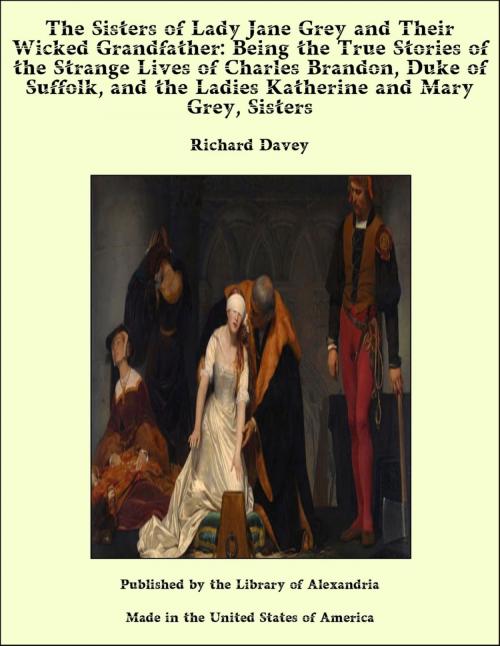The Sisters of Lady Jane Grey and Their Wicked Grandfather: Being the True Stories of the Strange Lives of Charles Brandon, Duke of Suffolk, and the Ladies Katherine and Mary Grey, Sisters
Nonfiction, Religion & Spirituality, New Age, History, Fiction & Literature| Author: | Richard Davey | ISBN: | 9781465616555 |
| Publisher: | Library of Alexandria | Publication: | March 8, 2015 |
| Imprint: | Language: | English |
| Author: | Richard Davey |
| ISBN: | 9781465616555 |
| Publisher: | Library of Alexandria |
| Publication: | March 8, 2015 |
| Imprint: | |
| Language: | English |
The amazing marriage of Katherine of Valois, widow of Henry V, with Owen Tudor, possibly accounts for much that was abnormal in the character of their royal descendants of the redoubted House of Tudor. The queen dowager was the daughter of the mad King Charles VI of France and of his licentious consort, Isabeau of Bavaria—bad blood, indeed; and Owen was a mere soldier of fortune. In his grandson Henry VII’s day, a goodly pedigree was discovered for him, which set forth that far from being a “mean born pup,” as was popularly reported, Owen was descended from Kenan, son of Coel, who was king of Britain, and brother of Helen, the mother of Constantine the Great. As to Owen ap Merideth ap Twydder or Tudor, good old Sandford affirms that “the Meanness of his Estate was recompensated by the Delicacy of his Person, so absolute in all the Lineaments of his Body, that the only Contemplation of it might make a Queen forget all other Circumstances”—which it did! Stowe, who lived near enough to those times to receive direct tradition concerning this brave soldier, says, in his Annals, that he was “as ignorant as any savage.” Tall beyond the average, the founder of the House of Tudor carried himself with “a perfect grace.” He was well featured, with hair that was curly and “yellow as gold.” At an entertainment given in 1423, and attended, notwithstanding her recent bereavement, by the widowed queen, this Adonis, while in the act of executing an intricate pirouette, fell at the royal lady’s feet. Whether the passion kindled by this ludicrous accident was reciprocated, we are not told; but so ardent was it, on Katherine’s part, at least, that she soon afterwards clandestinely married the handsome Welshman. The enemies of the House of Tudor averred that this secret marriage never really took place, and it is a singular fact that no allusion whatever is made to it in the hearse verse originally placed over the tomb of Queen Katherine in Westminster Abbey, and quoted in full in the contemporary Chronicle of William of Worcester.
The amazing marriage of Katherine of Valois, widow of Henry V, with Owen Tudor, possibly accounts for much that was abnormal in the character of their royal descendants of the redoubted House of Tudor. The queen dowager was the daughter of the mad King Charles VI of France and of his licentious consort, Isabeau of Bavaria—bad blood, indeed; and Owen was a mere soldier of fortune. In his grandson Henry VII’s day, a goodly pedigree was discovered for him, which set forth that far from being a “mean born pup,” as was popularly reported, Owen was descended from Kenan, son of Coel, who was king of Britain, and brother of Helen, the mother of Constantine the Great. As to Owen ap Merideth ap Twydder or Tudor, good old Sandford affirms that “the Meanness of his Estate was recompensated by the Delicacy of his Person, so absolute in all the Lineaments of his Body, that the only Contemplation of it might make a Queen forget all other Circumstances”—which it did! Stowe, who lived near enough to those times to receive direct tradition concerning this brave soldier, says, in his Annals, that he was “as ignorant as any savage.” Tall beyond the average, the founder of the House of Tudor carried himself with “a perfect grace.” He was well featured, with hair that was curly and “yellow as gold.” At an entertainment given in 1423, and attended, notwithstanding her recent bereavement, by the widowed queen, this Adonis, while in the act of executing an intricate pirouette, fell at the royal lady’s feet. Whether the passion kindled by this ludicrous accident was reciprocated, we are not told; but so ardent was it, on Katherine’s part, at least, that she soon afterwards clandestinely married the handsome Welshman. The enemies of the House of Tudor averred that this secret marriage never really took place, and it is a singular fact that no allusion whatever is made to it in the hearse verse originally placed over the tomb of Queen Katherine in Westminster Abbey, and quoted in full in the contemporary Chronicle of William of Worcester.















